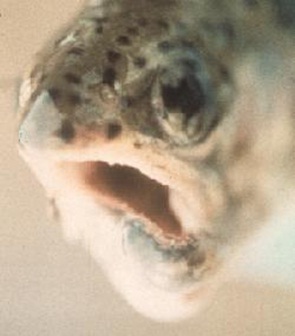Difference between revisions of "Whirling Disease"
From Glen Canyon Dam AMP
(add twg) |
(add whirling disease info) |
||
| Line 5: | Line 5: | ||
*[[Media:Whirling Disease AZ Game and Fish.PDF |121024_TWG_Whirling Disease AZ Game and Fish]] | *[[Media:Whirling Disease AZ Game and Fish.PDF |121024_TWG_Whirling Disease AZ Game and Fish]] | ||
*[http://wildlife.state.co.us/Fishing/Management/Pages/WhirlingDisease.aspx State of Colorado Parks and Wildlife- Whirling Disease and Colorado's Trout] | *[http://wildlife.state.co.us/Fishing/Management/Pages/WhirlingDisease.aspx State of Colorado Parks and Wildlife- Whirling Disease and Colorado's Trout] | ||
| + | |||
| + | ---- | ||
| + | *"Because the parasite causing the disease is water-borne, the AGFD has informed that the entire river, from Glen Canyon Dam to Lake Mead is considered to be infected. For this reason, AGFD advised that the best course of action to eliminate the risk of spreading the disease is to not remove and transport fish from any location in this segment." | ||
---- | ---- | ||
Revision as of 12:53, 28 December 2012
- 121024_TWG_Whirling Disease AZ Game and Fish
- State of Colorado Parks and Wildlife- Whirling Disease and Colorado's Trout
- "Because the parasite causing the disease is water-borne, the AGFD has informed that the entire river, from Glen Canyon Dam to Lake Mead is considered to be infected. For this reason, AGFD advised that the best course of action to eliminate the risk of spreading the disease is to not remove and transport fish from any location in this segment."
CLIFF NOTE VERSION
- Whirling disease is a parasitic condition affecting fish, primarily rainbow trout.
- Young fish are at greatest risk.
- First observed in the United States around 1958.
- Larger infected fish generally don't die but are carriers of the disease.
- Warm-water fish such as bass, walleye and catfish are not affected.
- Currently, No practical cure to treat wild trout infected with the disease.
- Once the disease parasite is established in the wild, it can persist indefinitely
- SIGNS INCLUDE: Whirling behavior- Blackened tail -Skeletal deformities
- WD has been identified in 25 states (2009)
- Trout species only- rainbow trout: highly susceptible, brown trout: can carry parasite, but generally do not show clinical signs
- Trout become resistant after 4-8 months
- Not harmful to humans, trout in WD infected waters are ok to eat
- Spore are very resistant
